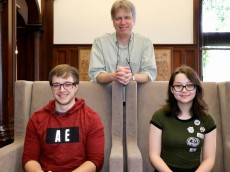Richters you should know: Haley Bader and Tim Nichin

Studying music’s connection with humans and the mind is helping two students get a head start on their preparation for graduate school. By working personally with a professor to prepare a new class, Haley Bader ’20 and Timothy Nichin ’20 are learning skills for their futures in higher education.
Through their work with Professor of Music Donald Meyer to create a class called “Music and the Mind” for next spring, Bader and Nichin are using their insight and passion for thought-provoking concepts to research the brain’s various interactions with music and generate course guidelines. Bader, a psychology major, and Nichin, a physics and math double major with a minor in music, are two Richter Scholars you should know.
Q: What drew you to Lake Forest College?
Bader: “I chose Lake Forest College because I knew I wanted a small, liberal arts college and I really liked LFC’s proximity to Chicago.”
Nichin: “I came to Lake Forest for a couple of reasons, but it really came down to how I felt about the school. I was deciding between here and University of Illinois at Urbana-Champaign. After visiting both schools, I just enjoyed the atmosphere here a lot more than at U of I.”
Q: Tell us about your research project.
Bader: “We are helping to build a class called “Music and the Mind” for Professor of Music Don Meyer, which will be offered in the spring. The goal of the class is to explore the complex relationships between people and music. Professor Meyer isn’t 100 percent sure on how the class is going to be structured yet, so the research that we are doing is going to shape the class. Basically, we are structuring the whole class around the name of the class: What does “music and the mind” mean? So we asked “what would I expect to be covered in this class?” and tried to form a structure around that.”
Nichin: “Most of the research will be done on seeing just how the human mind reacts to certain sounds and how certain songs can cause feelings. Professor Meyer actually brainstormed a couple of ideas for sections of the class, and I’ll give some examples just so you could see how it’s all over the place: the elements of music, how music works in the brain, the evolution of music, music and culture, therapeutic music, and then two especially interesting ones were questioning how music is used in advertising and then if music is dangerous.”
Q: How do you go about planning for a class?
Nichin: “Professor Meyer gave us a good idea of what he wants a homework assignment to be like and the time span it should take– one to two hours. So we’ll look at the readings that we think are going to be good, reading the chapter names in the books mainly and saying what the general idea is. Then we will try to find a video on youtube that is related to the topic, usually TED talks– there’s tons of good stuff there– and we’ll develop about five questions to go along with it.”
Bader: “We want it to be in-depth and also interesting. It’s a three day-a-week class, so we aren’t trying to kill them with homework. But it should be a supplement to the class.I wanted to make a class that I would want to take because it sounds cool– I mean if I had time in my schedule I would take it.”
Q: How will it benefit you to work with a professor this early in your academic career?
Nichin: “Being able to work with a professor after just one year in college is going to help me immensely. It will give me a chance to see what kind of work ethic will be needed to keep up the work. It will also give me some insight so I can improve a lot of my skills as a student.”
Bader: “I plan on going into graduate school, so working with a professor really gives me an advantage in knowing what to expect and how to manage my time in future research endeavors. The stuff we’ve looked up so far has been interesting and it’s specific to what I’m interested in because I want to possibly be a therapist and this has opened my eyes to applications I didn’t previously know about.”
Q: How will your experience in the Richter program help prepare you for your future career?
Bader: “I know I want to be a therapist, and I am considering a career in music therapy, so this specific program has given me a lot of insight into what that looks like, its uses, and how the brain reacts to music. This is all essential knowledge if I choose to go into that field.”
Nichin: “This will help me in my future career because I am thinking about going to graduate school and this will be a good chance to see what doing research will be like. I have always kind of wanted to be a professor at a college. After coming here for a year, I’ve gotten the chance to talk to professors about what graduate school is really like, and I knew this would be a good chance to see how I like research.”
–By Tracy Koenn and Sophie Mucciaccio

